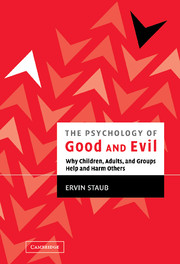Book contents
- Frontmatter
- Contents
- Preface
- Acknowledgments
- PART I INTRODUCTION AND CORE CONCEPTS
- PART II THE ROOTS OF HELPING OTHER PEOPLE IN NEED IN CONTRAST TO PASSIVITY
- PART III HOW CHILDREN BECOME CARING AND HELPFUL RATHER THAN HOSTILE AND AGGRESSIVE
- PART IV THE ORIGINS OF GENOCIDE, MASS KILLING, AND OTHER COLLECTIVE VIOLENCE
- 21 A Note on the Cultural–Societal Roots of Violence
- 22 The Psychology of Bystanders, Perpetrators, and Heroic Helpers
- 23 Steps Along a Continuum of Destruction: Perpetrators and Bystanders
- 24 The SS and the Psychology of Perpetrators: The Interweaving and Merging of Role and Person
- 25 The Origins of Genocide: Rwanda
- 26 Bystanders as Evil: The Example of Rwanda
- 27 Individual and Group Identities in Genocide and Mass Killing
- 28 Mass Murder: U.S. Involvement as Perpetrator, Passive Bystander, Helper
- 29 When Instigation Does Not Result in Mass Murder
- 30 Persian Gulf Conflict Was Reflection of Stormy Undercurrents in U.S. Psyche
- 31 Mob Violence: Cultural–Societal Sources, Instigators, Group Processes, and Participants
- 32 Understanding and Preventing Police Violence
- PART V THE AFTERMATH OF MASS VIOLENCE: TRAUMA, HEALING, PREVENTION, AND RECONCILIATION
- PART VI CREATING CARING, MORALLY INCLUSIVE, PEACEFUL SOCIETIES
- Appendix: What Are Your Values and Goals?
- Index
- References
25 - The Origins of Genocide: Rwanda
Published online by Cambridge University Press: 07 May 2010
- Frontmatter
- Contents
- Preface
- Acknowledgments
- PART I INTRODUCTION AND CORE CONCEPTS
- PART II THE ROOTS OF HELPING OTHER PEOPLE IN NEED IN CONTRAST TO PASSIVITY
- PART III HOW CHILDREN BECOME CARING AND HELPFUL RATHER THAN HOSTILE AND AGGRESSIVE
- PART IV THE ORIGINS OF GENOCIDE, MASS KILLING, AND OTHER COLLECTIVE VIOLENCE
- 21 A Note on the Cultural–Societal Roots of Violence
- 22 The Psychology of Bystanders, Perpetrators, and Heroic Helpers
- 23 Steps Along a Continuum of Destruction: Perpetrators and Bystanders
- 24 The SS and the Psychology of Perpetrators: The Interweaving and Merging of Role and Person
- 25 The Origins of Genocide: Rwanda
- 26 Bystanders as Evil: The Example of Rwanda
- 27 Individual and Group Identities in Genocide and Mass Killing
- 28 Mass Murder: U.S. Involvement as Perpetrator, Passive Bystander, Helper
- 29 When Instigation Does Not Result in Mass Murder
- 30 Persian Gulf Conflict Was Reflection of Stormy Undercurrents in U.S. Psyche
- 31 Mob Violence: Cultural–Societal Sources, Instigators, Group Processes, and Participants
- 32 Understanding and Preventing Police Violence
- PART V THE AFTERMATH OF MASS VIOLENCE: TRAUMA, HEALING, PREVENTION, AND RECONCILIATION
- PART VI CREATING CARING, MORALLY INCLUSIVE, PEACEFUL SOCIETIES
- Appendix: What Are Your Values and Goals?
- Index
- References
Summary
instigators
Intensely difficult economic and political conditions preceded the genocide in 1994 in Rwanda. Hutus, who constituted about 85% of a population of eight million people, with Tutsis making up about 14%, killed somewhere between 600,000 and 800,000 Tutsis. About 50,000 Hutus were also killed, either because they were politically moderate or because they came from the southern part of the country and were mistrusted by the current Hutu leadership from the Northwest (for historical information, see des Forges, 1999; Gourevitch, 1998; Kressel, 1996; Prunier, 1995; Smith, 1998).
In an already densely populated country, there was great population growth. In the late 1980s the price of coffee, the primary export of Rwanda, had substantially declined, as did the price of tin, the major mineral produced in Rwanda. In a highly authoritarian political system, where the elite grew rich while the population suffered, there were demands for greater rights by various groups. The economic problems and political pressures created divisions among the Hutu elite, who were vying for positions of advantage.
The invasion by the Tutsi Rwandan Patriotic Front (RPF) in 1990, consisting of refugees or children of refugees who fled after previous massacres, intensified political turmoil. Although this invasion was stopped, the RPF went on the offensive again in 1992 and then a year later after massacres of Tutsi peasants. Thus, in addition to difficult life conditions created by economic problems, there was both intense conflict between the dominant group and subordinate groups and a civil war.
- Type
- Chapter
- Information
- The Psychology of Good and EvilWhy Children, Adults, and Groups Help and Harm Others, pp. 341 - 345Publisher: Cambridge University PressPrint publication year: 2003



